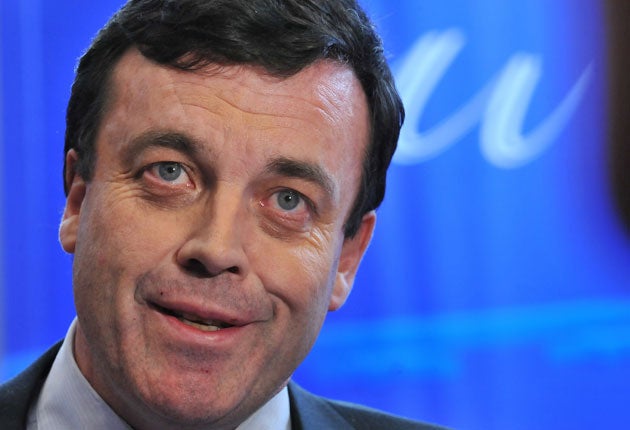Former Irish finance minister Brian Lenihan dies at age of 52

Your support helps us to tell the story
From reproductive rights to climate change to Big Tech, The Independent is on the ground when the story is developing. Whether it's investigating the financials of Elon Musk's pro-Trump PAC or producing our latest documentary, 'The A Word', which shines a light on the American women fighting for reproductive rights, we know how important it is to parse out the facts from the messaging.
At such a critical moment in US history, we need reporters on the ground. Your donation allows us to keep sending journalists to speak to both sides of the story.
The Independent is trusted by Americans across the entire political spectrum. And unlike many other quality news outlets, we choose not to lock Americans out of our reporting and analysis with paywalls. We believe quality journalism should be available to everyone, paid for by those who can afford it.
Your support makes all the difference.Brian Lenihan, the senior Irish politician who as finance minister struggled manfully but unsuccessfully to overcome his country's enormous economic problems, died yesterday in Dublin at the age of 52.
Although diagnosed with pancreatic cancer in 2009, he remained in the forefront of the Republic's efforts to stave off national bankruptcy, despite extensive chemotherapy and radiotherapy. Mr Lenihan was popular and highly respected, though some now regard aspects of his handling of the banking crisis as major mistakes which contributed to Ireland's huge level of debt.
But his popularity was such that he was one of the few senior members of Fianna Fáil to retain his parliamentary seat when the party was humiliatingly swept from power this year. At one stage, he was spoken of a possible future Prime Minister because of his political abilities and his family's long pedigree in politics. His father was deputy leader of Fianna Fáil and other relatives were also involved in politics. He inherited both his father's shrewdness and his personal popularity.
The high point of Mr Lenihan's political career came in 2008 when he was appointed finance minister, a post which made him a prime candidate for the future party leadership. But he held office only for a short time before the sky fell in as Ireland's years of economic boom came to a shuddering halt. His task suddenly shifted from presiding over prosperity to desperately trying to avoid catastrophe.
As a junior minister he had not been involved in the dangerous overheating of the economy, but he was left to deal with the effects of years of financial recklessness. The Prime Minister, Brian Cowen, was notoriously uncommunicative. While Mr Cowen's ratings dropped alarmingly, Mr Lenihan became the minister most trusted by the public. He always stuck by his crucial decision to guarantee deposits in Irish banks, arguing that it had averted complete collapse, but he appeared to badly underestimate the scale of the problem.
His contention that banking debts were manageable proved wrong since the amount of money was far beyond his expectations. He was forced to introduce three tough, cost-cutting budgets, with Ireland experiencing reduced living standards and soaring unemployment.
His credibility also suffered when, evidently acting on Mr Cowen's instructions, he denied reports that Ireland was going cap-in-hand to the International Monetary Fund. This was incorrect, for Dublin was indeed seeking a bailout. Mr Lenihan said: "I have a very vivid memory of going to Brussels and being on my own at the airport and looking at the snow gradually thawing and thinking to myself, 'This is terrible, no Irish minister has ever had to do this before'."
In January 2010, he announced he had been diagnosed with pancreatic cancer but would continue in office. In one of many tributes yesterday, President Mary McAleese said: "Brian had to confront challenges, the scale and gravity of which were unprecedented in the history of the state. Despite his illness, he faced up to those challenges with extraordinary but characteristic dignity, courage and good humour."
Join our commenting forum
Join thought-provoking conversations, follow other Independent readers and see their replies
Comments